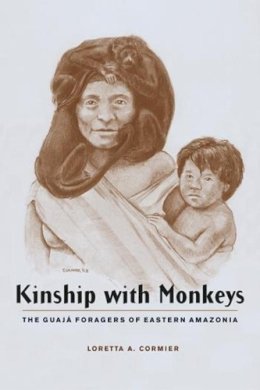
Stock image for illustration purposes only - book cover, edition or condition may vary.
Kinship with Monkeys
Loretta A. Cormier
€ 52.60
FREE Delivery in Ireland
Description for Kinship with Monkeys
Paperback. How can monkeys be both eaten as food and nurtured as children? Her research reveals that monkeys play a vital role in Guaja society, ecology, economy, and religion. In Guaja animistic beliefs, all forms of plant and animal life-especially monkeys-have souls and are woven into a comprehensive kinship system. Series: Historical Ecology Series. Num Pages: 288 pages, 10 illus. BIC Classification: 1KLSBZ; JFSL9; JHMP; PSAF; PSVW79. Category: (P) Professional & Vocational. Dimension: 229 x 152 x 17. Weight in Grams: 499.
Intrigued by a slide showing a woman breast-feeding a monkey, anthropologist Loretta A. Cormier spent fifteen months living among the Guaja, a foraging people in a remote area of Brazil. The result is this ethnographic study of the extraordinary relationship between the Guaja Indians and monkeys. While monkeys are a key food source for the Guaja, certain pet monkeys have a quasi-human status. Some infant monkeys are adopted and nurtured as human children while others are consumed in accordance with the "symbolic cannibalism" of their belief system. The apparent contradiction of this predator/protector relationship became the central theme of Cormier's research: How can monkeys be both eaten as food and nurtured as children? Her research reveals that monkeys play a vital role in Guaja society, ecology, economy, and religion. In Guaja animistic beliefs, all forms of plant and animal life-especially monkeys-have souls and are woven into a comprehensive kinship system. Therefore, all consumption can be considered a form of cannibalism. Cormier sets the stage for this enlightening study by examining the history of the Guaja and the ecological relationships between human and nonhuman primates in Amazonia. She also addresses the importance of monkeys in Guaja ecological adaptation as well as their role in the Guaja kinship system. Cormier then looks at animism and life classification among the Guaja and the role of pets, which provide a context for understanding "symbolic cannibalism" and how the Guaja relate to various forms of life in their natural and supernatural world. The book concludes with a discussion of the implications of ethnoprimatology beyond Amazonia, including Western perceptions of primates.
Product Details
Format
Paperback
Publication date
2003
Publisher
Columbia University Press United States
Number of pages
288
Condition
New
Series
Historical Ecology Series
Number of Pages
288
Place of Publication
New York, United States
ISBN
9780231125253
SKU
V9780231125253
Shipping Time
Usually ships in 15 to 20 working days
Ref
99-16
About Loretta A. Cormier
Loretta A. Cormier is an assistant professor of anthropology at the University of Alabama in Birmingham.
Reviews for Kinship with Monkeys
This book is an enchanting introduction to the world of anthropology for students and enthusiasts alike.
Carlotta Maggio & Elisabetta Visalberghi American Journal of Primatology very interesting reading...the principal beneficiaries of this book will be social and cultural anthropologists and ethnologists
Eckhard W. Heymann Current Anthropology Cormier presents a readable and enjoyable account of the Guaja and how their lives are intertwined with the lives of various primate species. Journal of Anthropological Research The best example yet of an emerging field called ethnoprimatology... Cormier deserves high praise.
W.C. McGrew Human Ecology
Carlotta Maggio & Elisabetta Visalberghi American Journal of Primatology very interesting reading...the principal beneficiaries of this book will be social and cultural anthropologists and ethnologists
Eckhard W. Heymann Current Anthropology Cormier presents a readable and enjoyable account of the Guaja and how their lives are intertwined with the lives of various primate species. Journal of Anthropological Research The best example yet of an emerging field called ethnoprimatology... Cormier deserves high praise.
W.C. McGrew Human Ecology
